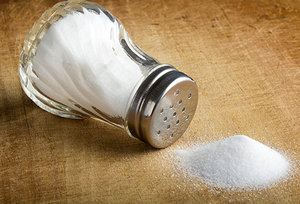Reduce Sodium, Reduce Eczema
By Editorial Staff
Sodium overload in the Standard American Diet (SAD, all too appropriately) is a significant risk factor for high blood pressure, cardiovascular disease, kidney disease and more. Although current guidelines recommend sodium intake below 2,300 mg / day, the average American consumes an estimated 3,400 mg, putting them at risk.
As you can imagine, that makes managing sodium intake a priority for most Americans. But there's another reason to keep your sodium in check that isn't mentioned above: managing eczema, the most common chronic inflammatory skin condition in the U.S., affecting up to 10% of adults and 30% of children. New research supports the relationship between sodium and eczema, particularly how reducing intake can help control eczema – or prevent it altogether.
 According to the study, findings from which appear in JAMA Dermatology, sodium intake (determined via urine samples) had a direct relationship with diagnosis, severity and whether the individual had an active case of eczema at the time. Each additional gram of sodium in 24-hour urine was associated with 11% higher odds of a diagnosis, 11% higher odds of increased severity, and 16% higher odds of an active case.
According to the study, findings from which appear in JAMA Dermatology, sodium intake (determined via urine samples) had a direct relationship with diagnosis, severity and whether the individual had an active case of eczema at the time. Each additional gram of sodium in 24-hour urine was associated with 11% higher odds of a diagnosis, 11% higher odds of increased severity, and 16% higher odds of an active case.
As mentioned, eczema certainly isn't your only reason to keep sodium at recommended daily levels or below; but as eczema sufferers will tell you, it's another great reason to check out nutritional labels before you buy / consume products; limit your fast-food and restaurant trips (most menu items have tremendously high amounts of sodium); and avoid supermarket products high in sodium (soups are a great example in general).

